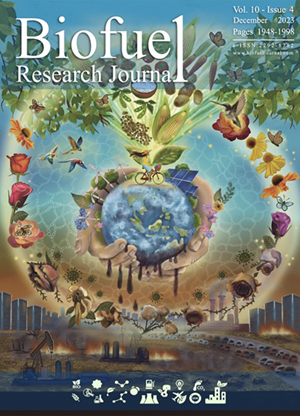运输部门绿色液体燃料综述:微生物解决气候变化的前景
IF 11.9
Q1 ENERGY & FUELS
引用次数: 145
摘要
环境恶化、全球气候变化以及随之而来的人口中与污染有关的健康问题的增加,都归因于化石燃料消费的增加,尤其是运输部门。因此,用生物燃料取代这些能源载体,也被称为温室气体排放的主要贡献者,被视为缓解上述挑战的解决方案。另一方面,通过促进更高一代的这些环保替代品,已经努力限制食用原料用于生物燃料生产,即第一代生物燃料。有鉴于此,本综述旨在全面评估细菌和酵母等微生物作为可持续生产液体生物燃料的催化剂的作用和重要性,包括生物乙醇、生物甲醇、生物丁醇、生物氨、生物煤油和生物甘油。这些生物燃料的各个方面,即背景、化学合成、微生物生产(包括野生和代谢工程物种的开发)、产品回收以及这些生物燃料生产的用作燃料添加剂的衍生物,都得到了全面的介绍和批判性的讨论。此外,还介绍了这些绿色液体燃料的工业特征,包括文献中报道的工业实践、面临的挑战以及加强这些实践的可能方法。本文章由计算机程序翻译,如有差异,请以英文原文为准。
A review on green liquid fuels for the transportation sector: a prospect of microbial solutions to climate change
Environmental deterioration, global climate change, and consequent increases in pollution-related health problems among populations have been attributed to growing consumption of fossil fuels in particular by the transportation sector. Hence, replacing these energy carriers, also known as major contributors of greenhouse gas emissions, with biofuels have been regarded as a solution to mitigate the above-mentioned challenges. On the other hand, efforts have been put into limiting the utilization of edible feedstocks for biofuels production, i.e., first generation biofuels, by promoting higher generations of these eco-friendly alternatives. In light of that, the present review is aimed at comprehensively assessing the role and importance of microorganisms such as bacteria and yeasts as catalysts for sustainable production of liquid biofuels including bioethanol, biomethanol, biobutanol, bio-ammonia, biokerosene, and bioglycerol. Various aspects of these biofuels, i.e., background, chemical synthesis, microbial production (including exploitation of wild and metabolically-engineered species), and product recovery as well as the derivatives produced from these biofuels which are used as fuel additives are thoroughly covered and critically discussed. Furthermore, the industrial features of these green liquid fuels including the industrial practices reported in the literature and the challenges faced as well as possible approaches to enhance these practices are presented.
求助全文
通过发布文献求助,成功后即可免费获取论文全文。
去求助
来源期刊

Biofuel Research Journal-BRJ
ENERGY & FUELS-
CiteScore
22.10
自引率
1.50%
发文量
15
审稿时长
8 weeks
期刊介绍:
Biofuel Research Journal (BRJ) is a leading, peer-reviewed academic journal that focuses on high-quality research in the field of biofuels, bioproducts, and biomass-derived materials and technologies. The journal's primary goal is to contribute to the advancement of knowledge and understanding in the areas of sustainable energy solutions, environmental protection, and the circular economy. BRJ accepts various types of articles, including original research papers, review papers, case studies, short communications, and hypotheses. The specific areas covered by the journal include Biofuels and Bioproducts, Biomass Valorization, Biomass-Derived Materials for Energy and Storage Systems, Techno-Economic and Environmental Assessments, Climate Change and Sustainability, and Biofuels and Bioproducts in Circular Economy, among others. BRJ actively encourages interdisciplinary collaborations among researchers, engineers, scientists, policymakers, and industry experts to facilitate the adoption of sustainable energy solutions and promote a greener future. The journal maintains rigorous standards of peer review and editorial integrity to ensure that only impactful and high-quality research is published. Currently, BRJ is indexed by several prominent databases such as Web of Science, CAS Databases, Directory of Open Access Journals, Scimago Journal Rank, Scopus, Google Scholar, Elektronische Zeitschriftenbibliothek EZB, et al.
 求助内容:
求助内容: 应助结果提醒方式:
应助结果提醒方式:


